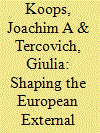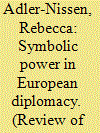| Srl | Item |
| 1 |
ID:
174567


|
|
|
|
|
| Summary/Abstract |
This article assesses the role, influence and core aspects of the EU High Representatives’ (HR/VPs) “political leadership” in the context of their efforts to advance the institutionalisation of the EEAS and its crisis management structures in the post-Lisbon era. By combining analytical lenses from the literature on “European political leadership”, foreign policy analysis (FPA) and political psychology with insights from a wide range of semi-structured interviews and primary sources, the article analyses how the leadership approaches of Catherine Ashton and Federica Mogherini were influenced by core aspects, such as institutional setting, situational factors and “personal qualities”. By examining how both HR/VPs and their chosen advisors sought to shape the EU’s EEAS and crisis management institutions, scholars can gain important insights about how “personal qualities” and prior foreign policy experience can influence the HR/VPs strategic choices and their impact within and across the EEAS. Finally, the article considers the differing effects between “maverick” and “orthodox” leadership and approaches and concludes that whilst outside perspectives can bring fresh ideas and institutional innovations, they will fail to be of lasting significance and permanence if not accompanied by sufficient support from the dominant foreign and security policy conventions.
|
|
|
|
|
|
|
|
|
|
|
|
|
|
|
|
| 2 |
ID:
141052


|
|
|
|
|
| Summary/Abstract |
National diplomacy is challenged by the rise of non-state actors from transnational companies to non-governmental organisations. In trying to explain these challenges, scholars tend to either focus on a specific new actor or argue that states will remain the dominant diplomatic players. This article develops an alternative Bourdieu-inspired framework addressing symbolic power. It conceptualises diplomacy in terms of a social field with agents (field incumbents and newcomers alike) who co-construct and reproduce the field by struggling for dominant positions. The framework is applied to the EU's new diplomatic service (the European External Action Service, EEAS), which is one of the most important foreign policy inventions in Europe to date. I show that the EEAS does not challenge national diplomacy in a material sense – but at a symbolic level. The EEAS questions the state's meta-capital, that is, its monopoly of symbolic power and this explains the counter-strategies adopted by national foreign services. The struggles to define the ‘genuine’ diplomat reveal a rupture in the European diplomatic field, pointing towards a transformation of European statehood and the emergence of a hybrid form of diplomacy. A focus on symbolic power opens up new avenues for the study of transformations of authority in world politics.
|
|
|
|
|
|
|
|
|
|
|
|
|
|
|
|